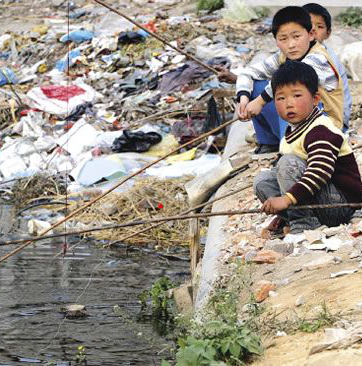China takes new steps to fix deadly flows
 China will shut down a range of dyeing plants, oil refineries and pesticide producers to clean up its water supply.
China will shut down a range of dyeing plants, oil refineries and pesticide producers to clean up its water supply.
China plans to close many small-scale enterprises in nearly a dozen industries to meet its goal of significantly improving water quality by 2020.
A plan released by China’s cabinet, the State Council, says the giant nation aims to get at least 70 per cent of the water quality of major river basins up to grade 3 on a five-point scale - good enough to use as drinking water.
It also calls for efforts to get 93 per cent of water supply for China’s largest cities up to the same level.
China’s water pollution problems are well-documented, from the factory discharge that turns rivers into a toxic kaleidoscope, to the dead livestock that periodically turn up in streams nationwide.
The Ministry of Land and Resources says 60 per cent of China’s groundwater is polluted, with most major rivers falling below the standards set in the plan.
Just 56 per cent of the water in the huge Songhua River basin meets the level of quality set out in the latest plan.
In 2013, the Chinese government acknowledged the existence of “cancer villages” – rural towns with high rates of cancer — most of which are clustered in areas with wells contaminated by industry and agriculture.
The unusable polluted water has created chronic water shortages in the northern part of the country as well.
China has undertaken many measures to tackle water pollution since the 1990s, focusing clean-up efforts on particular rivers and lakes.
The latest plan aims for the source, shutting down small-scale polluting enterprises, which often cannot afford to clean up factory discharge, and so are easier to shut down.







 Print
Print